China, Argentina ties aim for higher level
Updated: 2014-07-20 01:46
By ZHANG FAN in Rio de Janeiro (China Daily USA)
|
|||||||||
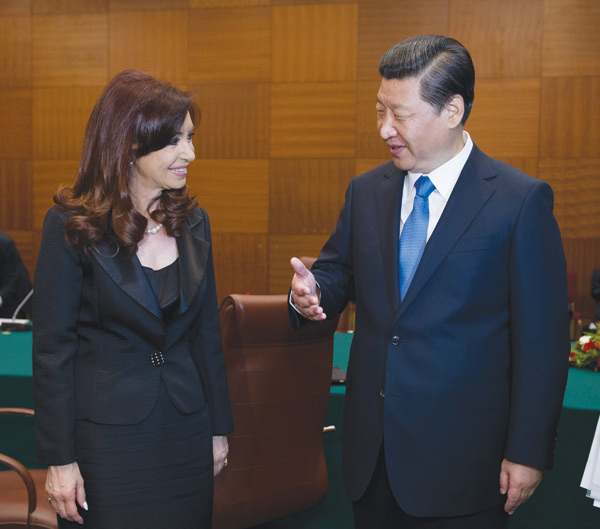 |
|
Chinese President Xi Jinping meets with Argentina President Cristina Fernandez de Kirchner in St. Petersburg on Sept 5, 2013.[Huang Jingwen/Xinhua] |
Chinese President Xi Jinping's state visit to Argentina is "historical" and will definitely advance cooperation between China and Argentina and elevate their bilateral relations to a new level, said Chinese Ambassador to Argentina Yin Hengmin.
This year marks the 42nd anniversary of the establishment of China-Argentina relations and also the 10th year since the two countries established a strategic partnership in 2004. "The leaders will review and summarize the development of bilateral relations in the 10 years and plan a blueprint for the future development," Yin said this month in an interview with China Daily. "They will also sign a series of important cooperation documents and trade agreements."
Yin said the current China-Argentina relationship is at the best stage in the history of the bilateral relations, with more frequent high-level visits and deeper political trust.
Yin's words were echoed by Argentine Ambassador to China Gustavo Martino. "Our President Cristina Fernández de Kirchner put the China-Argentine relationship in a priority position," said Martino. "Xi's visit will deepen the current connections to a new level."
Bilateral relations between China and Argentina enjoyed rapid development after former Argentine President Jorge Rafael Videla paid his first visit to China in 1980 and signed a comprehensive agreement involving culture, trade and financial cooperation. Since then, the two governments have maintained frequent visits from their presidents to ministers. About 50 government representatives from China and Argentina have paid official visits to each other's country since the 1990s.

Former Chinese President Yang Shangkun visited Argentina in June 1990, the first state visit by a Chinese president. Five months later, Argentina's then-president Carlos Menemvisited China. The visits further advanced relations between China and Argentina and are viewed as a milestone in the development of bilateral relations.
As of last year, China and Argentina's foreign ministries have held 12 negotiations, and 15 Chinese and Argentine cities and provinces — including the capital cities of Beijing and Buenos Aires — have established relationships.
In 1984, Argentina supported the Joint Declaration that China and the United Kingdom signed giving China sovereignty over Hong Kong in July 1997. At the same time, China also supported Argentina's stand in its disputes with the UK over the Malvinas Islands, 500 miles off the southeast coast of Argentina.
Chinese Foreign Ministry spokesman Hua Chunying said at a press conference on March 11, 2013, that the Malvinas Islands is an issue "left over by the history of colonialism" and China's position on the issue is "consistent". "We will, as always, support Argentina's sovereignty claim over the Malvinas Islands and hope that Argentina and the UK could properly solve this issue through negotiations in accordance with relevant UN resolutions," said Hua.
Besides cooperation on political issues, China and Argentina also have close economic ties. China is Argentina's second-largest trade partner, third-largest exporting market for agricultural products and third-largest investment origin country.
The trade volume between China and Argentina reached $14.8 billion last year, an increase of 2.8 percent over the previous year. Economic cooperation involves energy, infrastructure construction, finance, telecommunications and agriculture, which helped created more than 5,000 job opportunities in Argentina.
"The economies of China and Argentina are highly complementary," said Ambassador Yin. "There are a lot of potentials to be discovered in the future. The two countries can have further cooperation in high value-added products especially in the research and development of high-tech industries to optimize bilateral trade structure."
To stimulate economic development, the Argentine government planned to invest more in infrastructure construction. "China can play an important role in this plan," said Hector Marcos Timerman, the Argentine minister of Foreign Relations.
China Gezhouba Group Co Ltd, known for building the country's Three Gorges Dam, announced in 2013 that it will build two hydroelectric dams in Argentina at a cost of $4.7 billion. The project, in which Gezhouba holds a 60 percent interest and Argentina's Electroingenieria SA the rest, will involve designing and building the dams in Patagonia and maintaining them for 15 years.
Timerman said Argentina will build an additional eight large hydroelectric dams in 2014 and the country will be pleased if Chinese companies won the bidding for the projects.
Besides hydroelectric, China also has launched several projects with Argentina in railway construction. Xinhua reported that Argentina signed a $90 million agreemen in 2013 for 81 suburban railway cars to improve passenger safety in Buenos Aires.
Beijing-based China's CNR Corp Ltd also has signed contracts with Argentina, including a $2.2 billion agreement in 2010 for high-speed locomotives and passenger trains. China and Argentina signed a $10 billion agreement that year for Argentina to get electric facilities from China for 10 railway construction projects.
"The Argentine government appreciates China's effort in establishing good relations with developing economies and I hope the two sides can continue to deepen their cooperation in transportation industry," said Timerman.
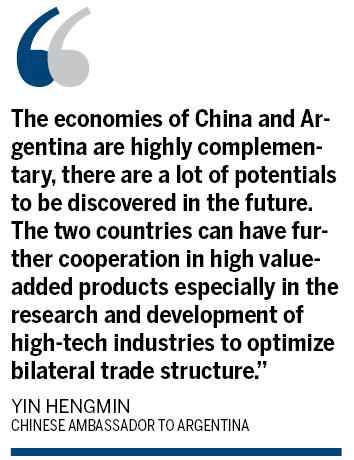
Huwei Technologies Co, a leading Chinese multinational networking and telecommunications equipment and services company with headquarters in Shenzhen, Guangdong, entered Argentina in 2001. It had invested about $120 million in Argentina by 2013. Last year it moved its South American headquarters from Sao Paulo, Brazil, to Buenos Aires, which is expected to bring $20 million of income for Argentina.
China National Offshore Oil Corp (CNOOC), a major national oil company in China, invested $3.1 billion in 2010 and acquired a 50-percent stake in Argentina's largest oil company, Bridas Corp, which is CNOOC's first share acquisition in Latin America.
The China-Argentina joint committee on trade and economy has held 19 meetings, with the latest one in Buenos Aires last year. Three working groups — economic complementarities, railway transport and infrastructure, and mining — held meetings on cooperation in investment, finance and trade and reached multiple agreements.
China and Argentina also have maintained frequent cultural communications. Local Chinese started to hold their Spring Festival temple fair in 2006, which has attracted participation by thousands of Argentineans.
China launched two Confucius Institutes in Argentina for Chinese language training and lessons about Chinese culture. The first Chinese-Spanish bilingual public school in Argentina was established this March in Buenos Aires.
"Argentina did not pay such attention to China when I worked here 20 years ago," said Yin, China's ambassador to Argentina. "But there are more and more young people willing to learn Chinese and understand Chinese culture. This is a major change in Argentina toward China."
Contact the writer at fanzhang@chinadailyusa.com
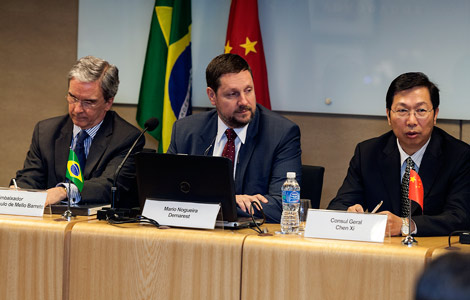
 Brazil launches China desk to handle economic ties with China
Brazil launches China desk to handle economic ties with China
 NY Wheel reels in Chinese EB-5 investors
NY Wheel reels in Chinese EB-5 investors
 The Penguins of Madagascar to enter China
The Penguins of Madagascar to enter China
 Panda cub Bao Bao turns one
Panda cub Bao Bao turns one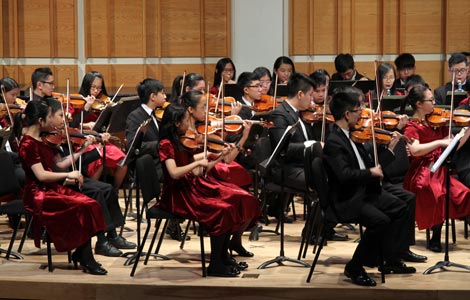
 HK kid's symphony returns to NY
HK kid's symphony returns to NY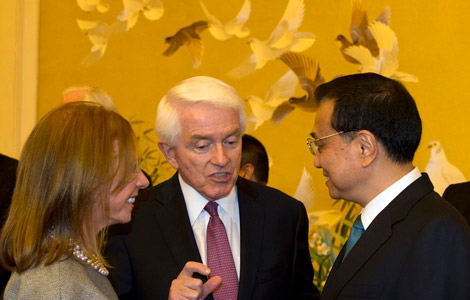
 China, US reach agreement
China, US reach agreement
 40 bodies from jet returned to Dutch soil
40 bodies from jet returned to Dutch soil
 Dance troupe's fusion performance wins over judges
Dance troupe's fusion performance wins over judges
Most Viewed
Editor's Picks

|

|

|

|

|

|
Today's Top News
Manufacturing hits an 18-month high
Transformers producers hit with breach of contract suit
US chipmaker to be deemed monopoly
Chinese still seek Beckel termination
One dead in shooting in Philadelphia
France: Air Algerie plane 'probably' crashed
TransAsia crash while landing in Taiwan
China, UC-Davis set up food safety center
US Weekly

|

|







